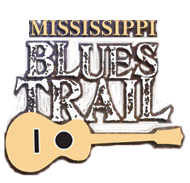Grenada Blues
Grenada Blues - Grenada
Grenada County-bred blues has long been an influential force in popular music. Musicians whose talents were nurtured in the Grenada area have included St. Louis bluesmen Walter Davis, a major blues recording artist of the 1930s, and Big George Brock, a world-renowned singer-harmonica player; Chicago blues guitar masters Magic Sam (Maghett) and Magic Slim (Holt); and Eddie Willis, a premier session musician whose guitar playing infused the Motown sound of Detroit with a taste of Mississippi blues.
Grenada musicians followed various paths to success, many joining the migration of Mississippians to Memphis, St. Louis, Chicago and Detroit. Two of these first blues artists to make recordings, in 1927, were Grenada County natives who moved to Memphis, female vocalist Arah “Baby” Moore (1900-1965) and guitarist Will Weldon (c. 1904-1934) of the Memphis Jug Band. Memphians with Grenada roots also included William Brown, who recorded for the Library of Congress in 1942, and blues icon Bukka White (c. 1904-1977), who once lived on a Grenada farm.
St. Louis became home base in the 1920s for Blues Hall of Fame pianist Walter Davis (1911-1963), one of the most prolific blues recording artists of the ‘30s and ‘40s. His hits “Come Back Baby,” “Angel Child,” and “13 Highway” were later recorded by Ray Charles, Memphis Slim and Muddy Waters. Onetime boxer Big George Brock, born in Yalobusha County in 1932, displayed heavyweight harmonica playing and singing in the Delta and St. Louis and recorded CDs and DVDs for Cat Head in Clarksdale. St. Louis blues guitar phenom Marquise Knox (b. 1991), has also claimed Grenada connections through his mother and guitar-playing uncles who were born here.
The Grenada area guitarist whose work has been most widely heard is Eddie Willis (born in Gore Springs in 1936). His accompaniments with the Funk Brothers studio group graced a multitude of Motown hits by Marvin Gaye, Stevie Wonder, the Supremes, Temptations, Four Tops and others. He also recorded with Mississippi-born bluesmen John Lee Hooker, Albert King and Eddie Burns. As a youngster Willis and a brood of Thompson stepbrothers and -sisters played a one-string guitar constructed of broom wire. Willis also learned fiddle from Will Chairs (c. 1917-2000), one of a number of fiddle players who entertained at local picnics and parties. Willis, who moved to Detroit in the early ‘50s, returned to Gore Springs in 1991.
In Chicago, artists with Grenada roots included influential guitarists Magic Sam (1937-1969) and his friend Magic Slim (1937-2013), harmonica player Alford “Blues King” Harris (1925-1986), who once had a local program on WNAG radio, keyboardist Cornell Harris Williams (“The Big DooWopper,” b. 1953) and guitarist Tre Hardiman (b. 1957). In Los Angeles, audiences have been treated to the guitar work of Kee Eso (Keyzo) Pitchford (b. 1973). Saxophonist Frank Wright (1925-1990), who was raised in Cleveland, Ohio, played with B.B. King and Bobby Bland before making a name as a free-jazz musician. The legendary Mississippi John Hurt (c. 1893-1966) once had a home in Grenada and his son, guitarist John William “Man” Hurt (b. 1932) also lived here. The local blues roster has also included Lewis Johnson, Little Will, Wade Allen, the Strickland brothers, James Willis, Frank Rimmer, Walter “Son Baby” Herron, Willie Kincaide, and Don “Tiny” Kincaide. Many bands played at juke joints on Union Street.
content © Mississippi Blues Commission
[ BACK TO TOP ]

